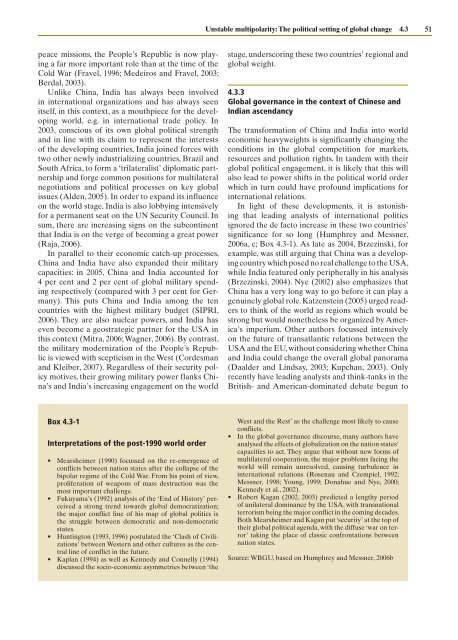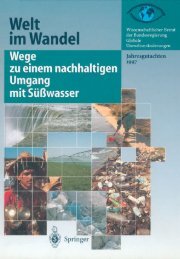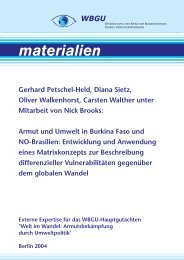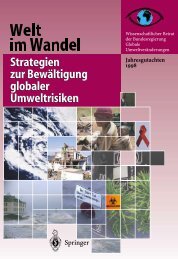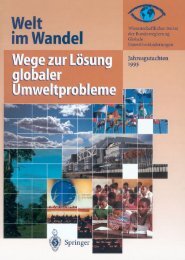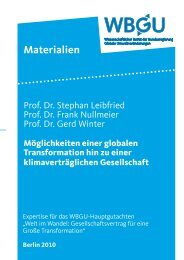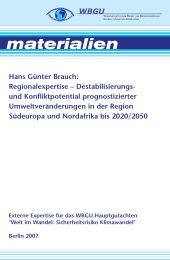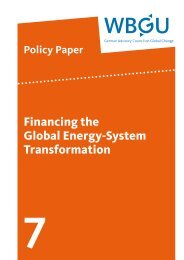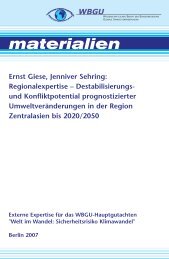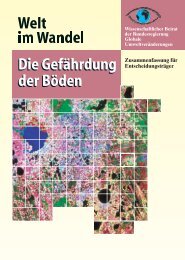World in Transition: Climate Change as a Security Risk - WBGU
World in Transition: Climate Change as a Security Risk - WBGU
World in Transition: Climate Change as a Security Risk - WBGU
Create successful ePaper yourself
Turn your PDF publications into a flip-book with our unique Google optimized e-Paper software.
peace missions, the People’s Republic is now play<strong>in</strong>g<br />
a far more important role than at the time of the<br />
Cold War (Fravel, 1996; Medeiros and Fravel, 2003;<br />
Berdal, 2003).<br />
Unlike Ch<strong>in</strong>a, India h<strong>as</strong> always been <strong>in</strong>volved<br />
<strong>in</strong> <strong>in</strong>ternational organizations and h<strong>as</strong> always seen<br />
itself, <strong>in</strong> this context, <strong>as</strong> a mouthpiece for the develop<strong>in</strong>g<br />
world, e.g. <strong>in</strong> <strong>in</strong>ternational trade policy. In<br />
2003, conscious of its own global political strength<br />
and <strong>in</strong> l<strong>in</strong>e with its claim to represent the <strong>in</strong>terests<br />
of the develop<strong>in</strong>g countries, India jo<strong>in</strong>ed forces with<br />
two other newly <strong>in</strong>dustrializ<strong>in</strong>g countries, Brazil and<br />
South Africa, to form a ‘trilateralist’ diplomatic partnership<br />
and forge common positions for multilateral<br />
negotiations and political processes on key global<br />
issues (Alden, 2005). In order to expand its <strong>in</strong>fluence<br />
on the world stage, India is also lobby<strong>in</strong>g <strong>in</strong>tensively<br />
for a permanent seat on the UN <strong>Security</strong> Council. In<br />
sum, there are <strong>in</strong>cre<strong>as</strong><strong>in</strong>g signs on the subcont<strong>in</strong>ent<br />
that India is on the verge of becom<strong>in</strong>g a great power<br />
(Raja, 2006).<br />
In parallel to their economic catch-up processes,<br />
Ch<strong>in</strong>a and India have also expanded their military<br />
capacities: <strong>in</strong> 2005, Ch<strong>in</strong>a and India accounted for<br />
4 per cent and 2 per cent of global military spend<strong>in</strong>g<br />
respectively (compared with 3 per cent for Germany).<br />
This puts Ch<strong>in</strong>a and India among the ten<br />
countries with the highest military budget (SIPRI,<br />
2006). They are also nuclear powers, and India h<strong>as</strong><br />
even become a geostrategic partner for the USA <strong>in</strong><br />
this context (Mitra, 2006; Wagner, 2006). By contr<strong>as</strong>t,<br />
the military modernization of the People’s Republic<br />
is viewed with scepticism <strong>in</strong> the West (Cordesman<br />
and Kleiber, 2007). Regardless of their security policy<br />
motives, their grow<strong>in</strong>g military power flanks Ch<strong>in</strong>a’s<br />
and India’s <strong>in</strong>cre<strong>as</strong><strong>in</strong>g engagement on the world<br />
Box 4.3-1<br />
Interpretations of the post-1990 world order<br />
Mearsheimer (1990) focussed on the re-emergence of<br />
conflicts between nation states after the collapse of the<br />
bipolar regime of the Cold War. From his po<strong>in</strong>t of view,<br />
proliferation of weapons of m<strong>as</strong>s destruction w<strong>as</strong> the<br />
most important challenge.<br />
Fukuyama’s (1992) analysis of the ‘End of History’ perceived<br />
a strong trend towards global democratization;<br />
the major conflict l<strong>in</strong>e of his map of global politics is<br />
the struggle between democratic and non-democratic<br />
states.<br />
Hunt<strong>in</strong>gton (1993, 1996) postulated the ‘Cl<strong>as</strong>h of Civilizations’<br />
between Western and other cultures <strong>as</strong> the central<br />
l<strong>in</strong>e of conflict <strong>in</strong> the future.<br />
Kaplan (1994) <strong>as</strong> well <strong>as</strong> Kennedy and Connelly (1994)<br />
discussed the socio-economic <strong>as</strong>ymmetries between ‘the<br />
Unstable multipolarity: The political sett<strong>in</strong>g of global change 4.3<br />
stage, underscor<strong>in</strong>g these two countries’ regional and<br />
global weight.<br />
4.3.3<br />
Global governance <strong>in</strong> the context of Ch<strong>in</strong>ese and<br />
Indian <strong>as</strong>cendancy<br />
The transformation of Ch<strong>in</strong>a and India <strong>in</strong>to world<br />
economic heavyweights is significantly chang<strong>in</strong>g the<br />
conditions <strong>in</strong> the global competition for markets,<br />
resources and pollution rights. In tandem with their<br />
global political engagement, it is likely that this will<br />
also lead to power shifts <strong>in</strong> the political world order<br />
which <strong>in</strong> turn could have profound implications for<br />
<strong>in</strong>ternational relations.<br />
In light of these developments, it is <strong>as</strong>tonish<strong>in</strong>g<br />
that lead<strong>in</strong>g analysts of <strong>in</strong>ternational politics<br />
ignored the de facto <strong>in</strong>cre<strong>as</strong>e <strong>in</strong> these two countries’<br />
significance for so long (Humphrey and Messner,<br />
2006a, c; Box 4.3-1). As late <strong>as</strong> 2004, Brzez<strong>in</strong>ski, for<br />
example, w<strong>as</strong> still argu<strong>in</strong>g that Ch<strong>in</strong>a w<strong>as</strong> a develop<strong>in</strong>g<br />
country which posed no real challenge to the USA,<br />
while India featured only peripherally <strong>in</strong> his analysis<br />
(Brzez<strong>in</strong>ski, 2004). Nye (2002) also emph<strong>as</strong>izes that<br />
Ch<strong>in</strong>a h<strong>as</strong> a very long way to go before it can play a<br />
genu<strong>in</strong>ely global role. Katzenste<strong>in</strong> (2005) urged readers<br />
to th<strong>in</strong>k of the world <strong>as</strong> regions which would be<br />
strong but would nonetheless be organized by America’s<br />
imperium. Other authors focussed <strong>in</strong>tensively<br />
on the future of transatlantic relations between the<br />
USA and the EU, without consider<strong>in</strong>g whether Ch<strong>in</strong>a<br />
and India could change the overall global panorama<br />
(Daalder and L<strong>in</strong>dsay, 2003; Kupchan, 2003). Only<br />
recently have lead<strong>in</strong>g analysts and th<strong>in</strong>k-tanks <strong>in</strong> the<br />
British- and American-dom<strong>in</strong>ated debate begun to<br />
West and the Rest’ <strong>as</strong> the challenge most likely to cause<br />
conflicts.<br />
In the global governance discourse, many authors have<br />
analysed the effects of globalization on the nation states‘<br />
capacities to act. They argue that without new forms of<br />
multilateral cooperation, the major problems fac<strong>in</strong>g the<br />
world will rema<strong>in</strong> unresolved, caus<strong>in</strong>g turbulence <strong>in</strong><br />
<strong>in</strong>ternational relations (Rosenau and Czempiel, 1992;<br />
Messner, 1998; Young, 1999; Donahue and Nye, 2000;<br />
Kennedy et al., 2002).<br />
Robert Kagan (2002, 2003) predicted a lengthy period<br />
of unilateral dom<strong>in</strong>ance by the USA, with transnational<br />
terrorism be<strong>in</strong>g the major conflict <strong>in</strong> the com<strong>in</strong>g decades.<br />
Both Mearsheimer and Kagan put ‘security’ at the top of<br />
their global political agenda, with the diffuse ‘ war on terror’<br />
tak<strong>in</strong>g the place of cl<strong>as</strong>sic confrontations between<br />
nation states.<br />
Source: <strong>WBGU</strong>, b<strong>as</strong>ed on Humphrey and Messner, 2006b<br />
51


